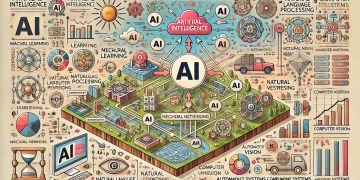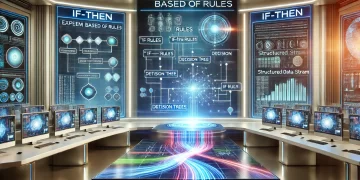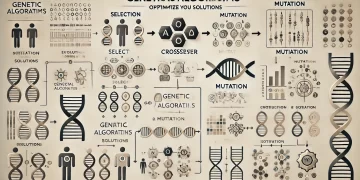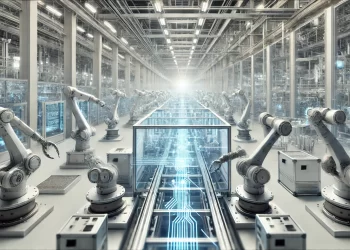As urban populations grow, cities worldwide are turning to Artificial Intelligence (AI) to improve infrastructure, optimize resource management, and enhance citizens’ quality of life. AI-powered smart city solutions address urban challenges such as traffic congestion, energy consumption, public safety, waste management, and environmental sustainability. This article explores various AI use cases in smart cities and how AI is revolutionizing urban living.
1. AI-Driven Traffic Management and Smart Mobility
AI optimizes traffic flow through real-time data analysis, reducing congestion and travel time. AI-powered traffic management systems analyze data from cameras, sensors, and GPS devices to dynamically adjust traffic signals. Smart mobility solutions, including AI-driven ride-sharing services and autonomous public transport, enhance urban mobility and reduce pollution.
2. Predictive Maintenance for Infrastructure
AI-driven predictive maintenance helps cities monitor the condition of roads, bridges, and public utilities. Machine learning algorithms analyze sensor data to detect potential failures before they occur, preventing costly repairs and ensuring infrastructure reliability. AI enhances maintenance scheduling, minimizing disruptions and improving service delivery.
3. AI-Powered Energy Optimization
AI contributes to energy efficiency by optimizing power distribution and consumption. Smart grids use AI to balance electricity demand and supply, reducing energy waste. AI-powered building management systems analyze occupancy and weather patterns to optimize heating, ventilation, and air conditioning (HVAC) systems, lowering energy costs and carbon footprints.
4. AI in Public Safety and Surveillance
AI enhances urban security through real-time monitoring, facial recognition, and predictive policing. AI-powered surveillance systems analyze video footage to detect anomalies, identify suspicious activities, and alert authorities. AI-driven crime prediction models help law enforcement agencies allocate resources effectively, improving public safety.
5. AI for Smart Waste Management
AI optimizes waste collection by predicting fill levels in bins and scheduling pickups accordingly. AI-driven robotic sorting systems improve recycling efficiency, reducing landfill waste. Smart waste management solutions lower operational costs and enhance environmental sustainability.
6. AI-Enabled Environmental Monitoring
AI assists in monitoring air quality, water pollution, and climate conditions. AI-powered sensors analyze environmental data, enabling city authorities to take proactive measures against pollution. AI-driven climate models predict extreme weather events, helping cities prepare for natural disasters and mitigate risks.
7. AI in Smart Healthcare and Emergency Response
AI enhances healthcare accessibility through telemedicine, predictive analytics, and smart emergency response systems. AI-driven predictive models help hospitals manage patient flow and allocate resources efficiently. AI-powered emergency response systems use real-time data to optimize ambulance dispatch and reduce response times.
8. AI-Driven Smart Governance
AI streamlines administrative processes, automates service delivery, and improves citizen engagement. AI-powered chatbots assist residents in accessing government services, reducing wait times and improving efficiency. AI-driven policy analytics help city planners make data-driven decisions for urban development.
9. AI in Smart Water Management
AI improves water distribution and leak detection by analyzing real-time sensor data. AI-driven water management systems predict consumption patterns, optimize supply, and prevent water wastage. AI-powered desalination and purification systems enhance water quality and conservation efforts.
10. AI for Sustainable Urban Planning
AI-driven data analytics assist city planners in designing smart urban spaces. AI models analyze population growth, traffic patterns, and environmental impact to optimize city layouts. AI helps in the development of green spaces, pedestrian-friendly zones, and energy-efficient buildings to create sustainable urban environments.
Conclusion
AI is transforming smart cities by enhancing efficiency, sustainability, and urban resilience. From intelligent traffic management to predictive maintenance, AI-driven solutions improve the quality of urban life while addressing critical challenges. As AI technology continues to advance, its integration into smart city initiatives will shape the future of urban living.
References
- McKinsey & Company. (2023). “The Role of AI in Smart Cities.”
- World Economic Forum. (2022). “AI-Powered Traffic Management and Mobility Solutions.”
- Deloitte Insights. (2023). “Predictive Maintenance and AI-Driven Infrastructure Management.”
- Harvard Business Review. (2023). “AI in Public Safety and Surveillance.”
- Gartner. (2022). “AI-Enabled Smart Governance and Citizen Services.”
- PwC. (2023). “Sustainable Urban Planning with AI.”




































